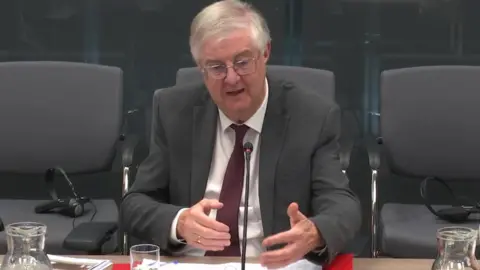 Senedd Cymru
Senedd CymruThe Welsh government finance secretary has said ministers will consider raising income tax next year but he would need a “lot of persuasion”.
Mark Drakeford said raising the basic 20p rate would bring in “significant” money but hit those on modest incomes as tax thresholds have been frozen until 2028 and “more and more people” are paying the tax as pay rises with inflation.
He said a “young woman” in his Cardiff West constituency told him she “hadn’t eaten for three days” after paying her council tax bill “left her with nothing to manage”.
Drakeford said ministers look at income tax each year but he was concerned about those “right on the very edge of managing, and sometimes not managing”.
The Conservatives called on Labour ministers to rule out any income tax rise.
The Welsh government has had the ability to raise or lower the three rates of income tax in Wales since 2019 but has never done so.
Former first minister Drakeford, appointed finance secretary earlier this month by new First Minister Eluned Morgan, was giving evidence to the Senedd’s finance committee ahead of the Welsh government’s budget on 10 December.
He has held the finance portfolio previously, as he has health.
On income tax, he told the committee, “we will look at it of course, as we always do, it is an important lever the Welsh government has”.
“In the budget process there will undoubtedly be a cabinet debate about whether or not we should change the Welsh rates of income tax,” he said.
“There is every year, in my experience, particularly the toughest years.”
“But the only way you can raise significant amounts of money for income tax in Wales is by increasing the basic rate, the additional and the higher rates do not bring you in anything like a sum of money you could genuinely regard as being useful to you in the budget process.”
Fiscal drag
Drakeford said that with the basic rate there was a problem with so called “fiscal drag”, where pay rises over the years with inflation and more people are dragged into paying income tax.
“You’ll be paying income tax on an income of £12,500 pounds,” he said.
He described “a constituency case that came my way at the end of last week, of a young woman who is working, who is doing a very important job, but where her ability to meet her bills from her very, very modest income is just beyond her ability to manage”.
“This is a very responsible person. Her letter to me said that she hadn’t eaten for three days because she’d paid her council tax bill, and that had left her with nothing to manage,” he said.
“That’s the person I have in my head when we talk about raising rates of income tax, not people who are able to do it and would want to make a bigger contribution but the people who are right on the very edge of managing and sometimes not managing.”
Drakeford was responding to a question from Welsh Conservative shadow finance minister Peter Fox, who later called on Labour to rule out any income tax rise because it would be a “punitive measure that will hit people in their pockets”.
Combined with the UK Labour government’s “scrapping of winter fuel payments for most pensioners, a tax hike will compound the misery for people the length and breadth of Wales”, he said.
